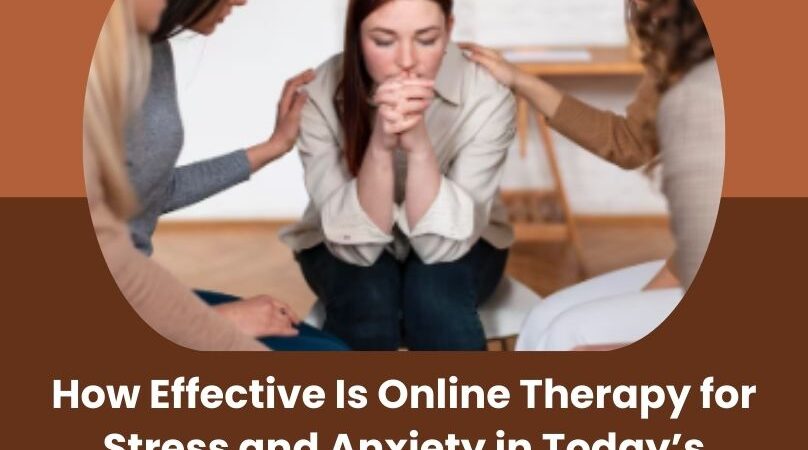How Effective Is Online Therapy for Stress and Anxiety in Today’s Digital Age?
In today’s fast-paced world, many of us juggle long work hours, constant notifications, and unspoken family expectations. It’s no surprise that stress and anxiety have become everyday companions for countless individuals. While occasional stress is natural, persistent anxiety can interfere with sleep, relationships, and productivity. This raises an important question: Can online therapy really help us find calm in the digital chaos?
This article explores the effectiveness of therapy for stress and anxiety delivered through online platforms, highlighting its benefits, limitations, and how it can blend with personal self-care practices.
Understanding the Need: Stress and Anxiety in the Modern World
Stress can come from many directions—tight deadlines at work, competitive academic environments, financial worries, or even the subtle pressure of keeping up with social circles. While everyday stress may pass once the situation resolves, anxiety often lingers, creating a cycle of overthinking, restlessness, and physical discomfort.
Recognizing when stress turns into anxiety is vital. Seeking professional help is not a weakness but a sign of courage and self-respect. Interestingly, while technology sometimes fuels stress—through endless messages and online comparisons—it also offers solutions. Online platforms have become gateways to therapy for stress and anxiety, making support more accessible than ever before.
What Does Online Therapy for Stress and Anxiety Look Like?
Online therapy isn’t just a chat with a stranger behind a screen. It mirrors the structure of traditional counseling but with added flexibility. Sessions may take place via video calls, phone, or even secure chat platforms, depending on personal comfort.
Among the most widely used approaches is Cognitive Behavioral Therapy (CBT), which has shown significant effectiveness in treating anxiety. Therapists also integrate mindfulness practices, relaxation techniques, and problem-solving strategies.
Crucially, online therapy involves real professionals—licensed psychologists, counselors, or psychiatrists—who bring both empathy and expertise. This ensures that therapy for stress and anxiety remains structured, personalized, and rooted in proven methods, rather than casual conversation.
The Effectiveness of Online Therapy: What Research and Experience Say
Several studies suggest that online therapy is comparable in effectiveness to face-to-face sessions for managing stress and anxiety disorders. For example, meta-analyses have shown that CBT delivered online can significantly reduce anxiety symptoms.
But beyond data, lived experiences matter. Many individuals report feeling more at ease opening up from the comfort of their own homes, which enhances the therapeutic process. Success largely depends on three factors: the bond between client and therapist, the individual’s commitment to the process, and the reliability of the platform being used.
When these elements align, online therapy becomes a safe, effective, and empowering avenue for healing.
Key Benefits of Choosing an Online Path for Your Mental Wellness
Online therapy for stress and anxiety comes with several distinct advantages:
Accessibility: Whether living in a busy city or a quieter area, therapy is only a click away. Physical distance or mobility challenges no longer create barriers.
Affordability: Many platforms offer flexible pricing, making professional care less intimidating financially compared to traditional clinics.
Convenience & Flexibility: Sessions can be scheduled around work, study, or family commitments—making it easier to stay consistent.
Anonymity & Reduced Stigma: For those hesitant about seeking therapy openly, online sessions provide the privacy to begin healing without fear of judgment.
These benefits often encourage individuals to take that first step toward improving their mental health.
Important Considerations Before You Start
While online therapy is effective, it’s important to keep some considerations in mind:
Not for Crises: In such cases, take immediate support from reputed sources.
Tech Requirements: A stable internet connection, a private environment, and comfort with digital tools are necessary for meaningful sessions.
Choosing the Right Fit: Always ensure the therapist is qualified and licensed. Reading reviews or seeking recommendations can help in finding a trusted professional.
Blending Professional Help with Personal Practice: The Role of a Mental Health Self-Care Course
Therapy can be transformative, but its impact deepens when paired with daily practices. This is where a mental health self-care course can play a complementary role. Such courses often include tools like guided meditation, journaling exercises, breathing techniques, and resilience-building activities.
Engaging in a mental health self-care course alongside therapy helps reinforce progress between sessions. It empowers individuals to manage their thoughts and emotions proactively, making recovery more holistic and sustainable.
Conclusion: Taking the Next Step Towards Peace of Mind
Online therapy has emerged as a highly effective, accessible, and compassionate way to address stress and anxiety in today’s digital age. When combined with personal practices such as a mental health self-care course, it can help individuals build resilience and embrace peace of mind. The first step may feel daunting, but prioritizing mental well-being is one of the most powerful investments one can make in a happier, healthier future.

